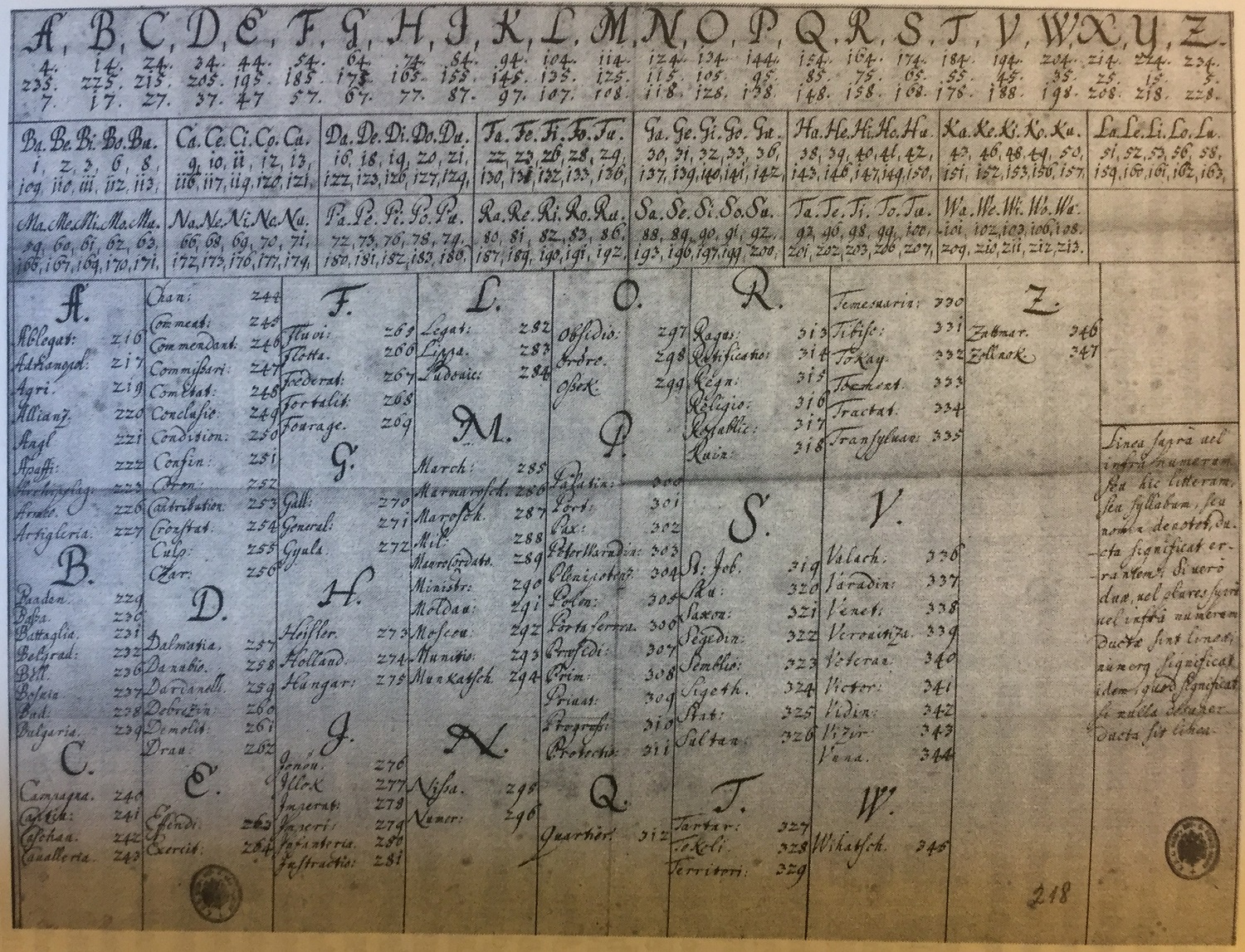|
Nomenclator , a system of names or terms
{{disambiguation ...
Nomenclator may refer to: *''Nomenclator omnium rerum propria nomina variis linguis explicata indicans'', 16th century book written by Hadrianus Junius *Nomenclator, in cryptography, a kind of substitution cypher *Nomenclator (nomenclature) as a noun meaning: a book listing names or terms; someone providing names to another person; an official announcing people at a public gathering; a person who applies names. *''Nomenclator'' of Leiden University Library, the first printed institutional library catalog See also * Nomenclature Nomenclature (, ) is a system of names or terms, or the rules for forming these terms in a particular field of arts or sciences. The principles of naming vary from the relatively informal naming conventions, conventions of everyday speech to the i ... [...More Info...] [...Related Items...] OR: [Wikipedia] [Google] [Baidu] |
Nomenclator (nomenclature)
A nomenclator ( ; English plural nomenclators, Latin plural nomenclatores; derived from the Latin ''nomen''- name + ''calare'' - to call), in classical times, referred to a slave whose duty was to recall the names of persons his master met during a political campaign. Later this became names of people in any social context and included other socially important information. However, it has taken on several other meanings and also refers to a book containing collections or lists of words. It also denotes a person, generally a public official, who announces the names of guests at a party or other social gathering or ceremony. In more general terms still, it is a person who provides or creates the names for things, and this can apply to the application of names in a scientific or any other context, but especially in relation to specialist terminologies, glossaries etc. Nomenclators in biology Several nomenclators have been created in biology. They usually list the names of gen ... [...More Info...] [...Related Items...] OR: [Wikipedia] [Google] [Baidu] |
Hadrianus Junius
Hadrianus Junius (1511–1575), also known as Adriaen de Jonghe, was a Dutch physician, classical scholar, translator, lexicographer, antiquarian, historiographer, emblematist, school rector, and Latin poet. He is not to be confused with several namesakes (including a seventeenth-century Amsterdam school rector). He was not related to Franciscus Junius. Biography Life Youth and education Adriaen de Jonge or Hadrianus Junius, was born in the West Frisian town of Hoorn on 1 July 1511, from a family of local regents. He attended the Latin School in Haarlem. At the relatively advanced age of 23, he went to study in Louvain, where he spent a couple of years. He then embarked on his peregrinatio academica, which led him through Siena, Bologna, Venice and Rome. In his letters, he reports on his visits to the famous legal humanist Andrea Alciato, his attendance at an interrupted Greek-orthodox liturgical service in Venice, and on an experiment with glow-worms in the Bolognese coun ... [...More Info...] [...Related Items...] OR: [Wikipedia] [Google] [Baidu] |
Substitution Cipher
In cryptography, a substitution cipher is a method of encrypting in which units of plaintext are replaced with the ciphertext, in a defined manner, with the help of a key; the "units" may be single letters (the most common), pairs of letters, triplets of letters, mixtures of the above, and so forth. The receiver deciphers the text by performing the inverse substitution process to extract the original message. Substitution ciphers can be compared with transposition ciphers. In a transposition cipher, the units of the plaintext are rearranged in a different and usually quite complex order, but the units themselves are left unchanged. By contrast, in a substitution cipher, the units of the plaintext are retained in the same sequence in the ciphertext, but the units themselves are altered. There are a number of different types of substitution cipher. If the cipher operates on single letters, it is termed a simple substitution cipher; a cipher that operates on larger groups of letters ... [...More Info...] [...Related Items...] OR: [Wikipedia] [Google] [Baidu] |
Library Catalog
A library catalog (or library catalogue in British English) is a register of all bibliographic items found in a library or group of libraries, such as a network of libraries at several locations. A catalog for a group of libraries is also called a union catalog. A bibliographic item can be any information entity (e.g., books, computer files, graphics, realia, cartographic materials, etc.) that is considered library material (e.g., a single novel in an anthology), or a group of library materials (e.g., a trilogy), or linked from the catalog (e.g., a webpage) as far as it is relevant to the catalog and to the users (patrons) of the library. The card catalog was a familiar sight to library users for generations, but it has been effectively replaced by the online public access catalog (OPAC). Some still refer to the online catalog as a "card catalog". Some libraries with OPAC access still have card catalogs on site, but these are now strictly a secondary resource and are seldom ... [...More Info...] [...Related Items...] OR: [Wikipedia] [Google] [Baidu] |


